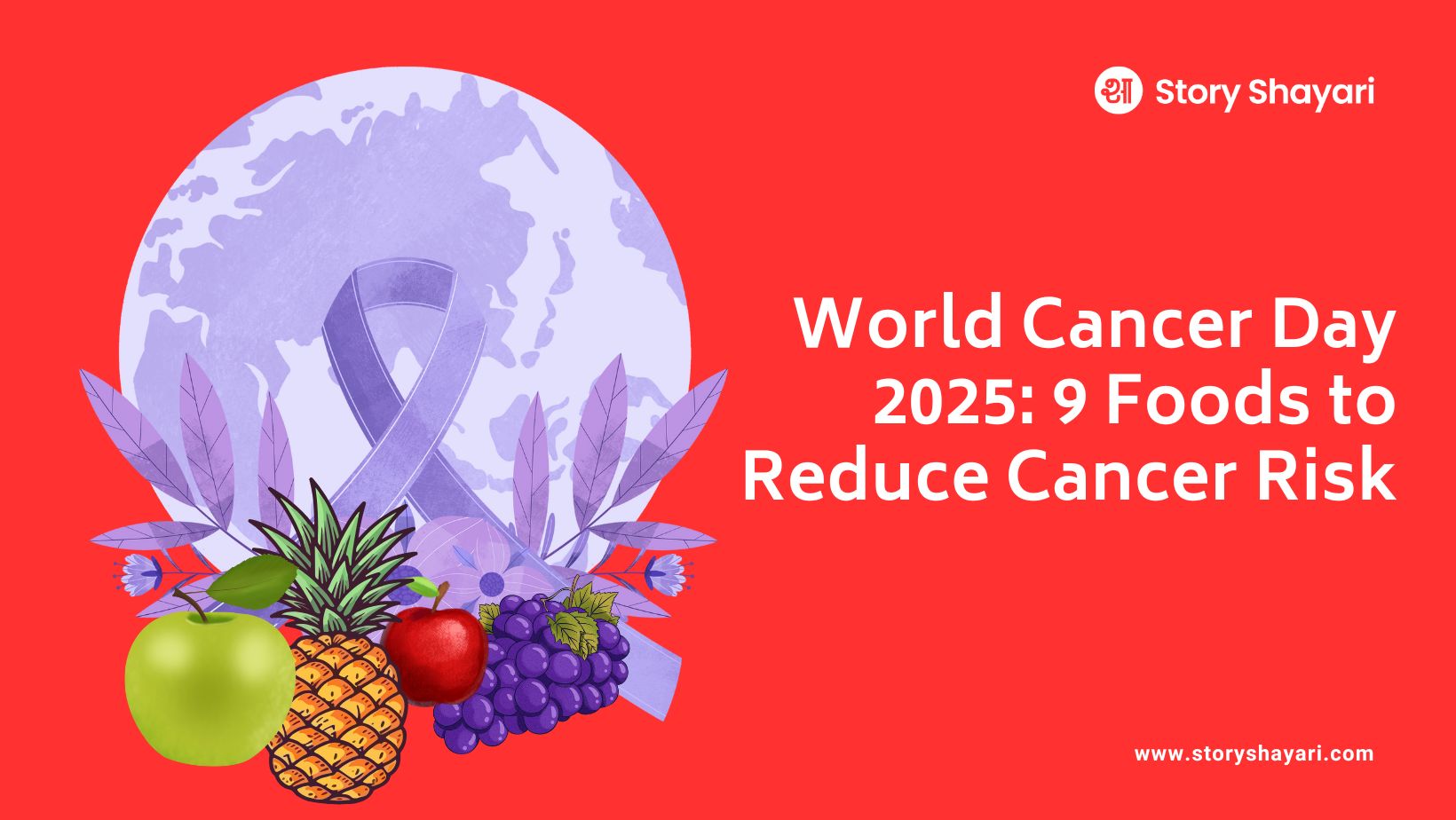World Cancer Day is observed annually on February 4th to raise awareness about cancer, promote prevention strategies, encourage early detection, and advocate for effective treatment options. With millions of people affected by cancer worldwide, this day serves as a reminder of the importance of proactive health choices and lifestyle modifications that can help reduce the risk of cancer. One of the most effective ways to lower cancer risk is through a healthy diet. Certain foods contain powerful antioxidants, phytochemicals, fibre, and essential nutrients that can protect cells from damage, reduce inflammation, and strengthen the body’s natural defence system.
Here, we share a list of nine powerful foods you should consider incorporating into your daily diet to minimize cancer risk and promote overall well-being.
Table of Contents
Toggle1. Broccoli
Broccoli is a cruciferous vegetable rich in sulforaphane, a potent compound known for its ability to inhibit cancer cell growth and enhance the body’s detoxification processes. Studies suggest that sulforaphane plays a significant role in reducing the risk of breast, prostate, and colon cancers. Additionally, the high fibre content in broccoli aids in digestion and supports gut health, which is crucial in preventing colorectal cancer.
How to Include Broccoli in Your Diet:
- Add steamed broccoli to salads, stir-fries, or pasta dishes.
- Blend it into soups or green smoothies for an extra nutritional boost.
- Roast broccoli with olive oil, garlic, and a pinch of sea salt for a delicious side dish.
2. Turmeric
Turmeric contains curcumin, a powerful anti-inflammatory and antioxidant compound that has been extensively studied for its cancer-fighting properties. Curcumin has been shown to inhibit tumour growth and prevent the spread of cancer cells, particularly in breast, prostate, lung, and colon cancers.
Also Read : दिल्ली में मौसम में बदलाव: ठंड बढ़ेगी, हल्की बारिश का पूर्वानुमान
How to Include Turmeric in Your Diet:
- Add turmeric powder to soups, stews, and curries.
- Mix it into warm milk or tea for a soothing beverage.
- Sprinkle turmeric over roasted vegetables or scrambled eggs.
3. Berries
Strawberries, blueberries, raspberries, and blackberries are loaded with anthocyanins and ellagic acid, antioxidants that help protect cells from DNA damage and slow down the proliferation of cancer cells. Studies indicate that berries can reduce the risk of oesophageal, colon, and breast cancers.
How to Include Berries in Your Diet:
- Add fresh berries to your breakfast cereal, oatmeal, or yogurt.
- Blend them into smoothies for a refreshing and nutritious drink.
- Enjoy berries as a natural and healthy dessert option.
4. Garlic
Garlic is a powerhouse of health benefits, thanks to its active compound allicin, which possesses strong immune-boosting and anti-cancer properties. Studies have shown that regular garlic consumption can lower the risk of stomach, colorectal, and prostate cancers by reducing inflammation and neutralizing cancer-causing substances.
How to Include Garlic in Your Diet:
- Use fresh garlic in cooking, including soups, sauces, and stir-fries.
- Crush or chop garlic and let it sit for a few minutes before cooking to enhance its health benefits.
- Add raw garlic to salad dressings or dips.
5. Green Tea
Green tea is packed with catechins, powerful antioxidants that prevent cell damage and slow down the growth of cancerous cells. Research suggests that drinking green tea regularly can reduce the risk of breast, liver, and prostate cancers.
How to Include Green Tea in Your Diet:
- Enjoy 2–3 cups of green tea daily.
- Use green tea as a base for smoothies.
- Add a squeeze of lemon to enhance the absorption of antioxidants.
6. Tomatoes
Tomatoes are a rich source of lycopene, an antioxidant that gives them their vibrant red colour and has been linked to a reduced risk of prostate, lung, and stomach cancers. Cooking tomatoes increases lycopene absorption, making it easier for the body to utilize its benefits.
How to Include Tomatoes in Your Diet:
- Add tomatoes to salads, sandwiches, and wraps.
- Use tomato-based sauces for pasta and soups.
- Roast or grill tomatoes for enhanced flavour and nutrient absorption.
7. Nuts
Walnuts, almonds, and Brazil nuts contain omega-3 fatty acids, selenium, and polyphenols, all of which exhibit anti-cancer properties. Research has linked nut consumption to a lower risk of colon, breast, and pancreatic cancers.
How to Include Nuts in Your Diet:
- Snack on a handful of mixed nuts daily.
- Add chopped nuts to yogurt, cereal, or baked goods.
- Use nut butters as a spread on toast or in smoothies.
8. Leafy Greens
Spinach, kale, and Swiss chard are packed with folate, carotenoids, and fibre, which help protect against DNA damage and slow tumour growth. These greens are particularly effective in reducing the risk of breast, skin, and stomach cancers.
How to Include Leafy Greens in Your Diet:
- Add leafy greens to salads, wraps, and sandwiches.
- Blend them into smoothies for a nutrient boost.
- Sauté spinach or kale with garlic and olive oil for a tasty side dish.
9. Citrus Fruits
Oranges, lemons, and grapefruits are high in vitamin C and flavonoids, which help neutralize harmful free radicals and boost immunity. Studies suggest that a diet rich in citrus fruits can lower the risk of oesophageal, stomach, and pancreatic cancers.
How to Include Citrus Fruits in Your Diet:
- Enjoy fresh citrus fruits as a snack.
- Squeeze lemon or orange juice over salads or grilled fish.
- Add citrus zest to baked goods or teas for extra flavour.
Conclusion
While no single food can completely prevent cancer, maintaining a balanced, nutrient-rich diet with a variety of antioxidant and fibre-rich foods can significantly reduce the risk. Incorporating these nine powerful foods into your daily meals can enhance your overall health and well-being, supporting your body’s natural defences against cancer. Along with a healthy diet, regular physical activity, stress management, and routine medical check-ups play a crucial role in cancer prevention.
On this World Cancer Day 2025, let’s commit to making healthier food choices and raising awareness about the importance of nutrition in cancer prevention. Small dietary changes today can lead to a healthier future for all.
































